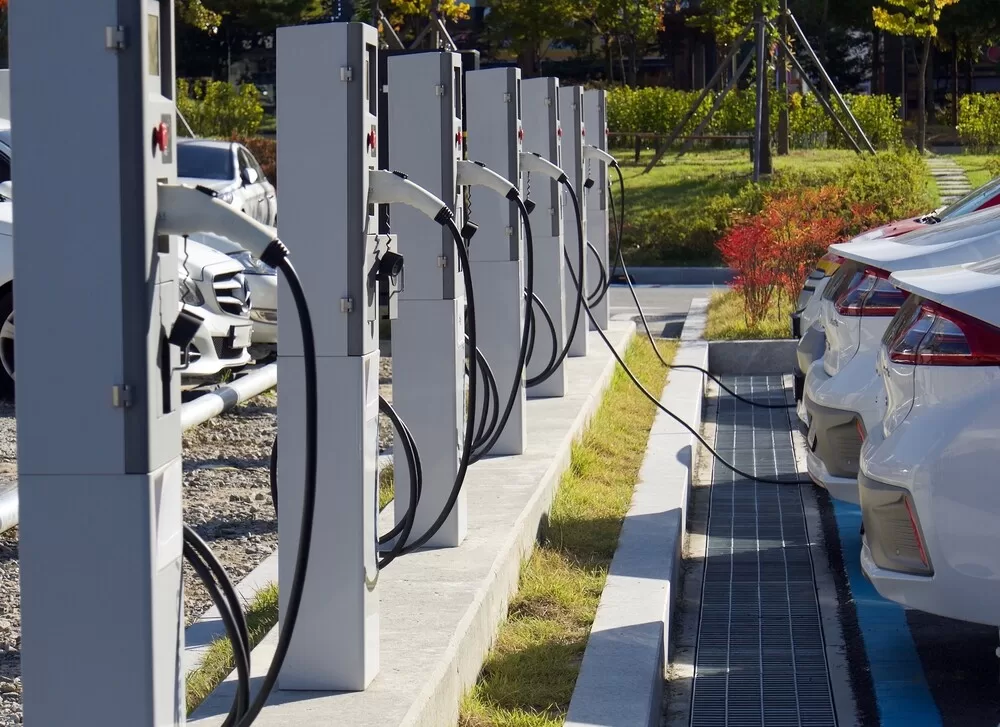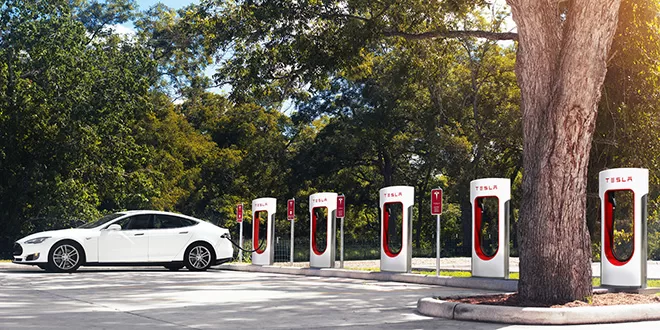As electric vehicles (EVs) continue to gain popularity, the need for a reliable and extensive charging infrastructure becomes more evident. One company that has been at the forefront of this EV revolution is Tesla. With its pioneering electric cars and a vast network of charging stations, Tesla has played a crucial role in promoting the adoption of electric vehicles. In this article, we will explore the Tesla Charging Network and discuss all the upcoming compatible EVs that will benefit from this infrastructure.
The Tesla Charging Network – A Game-Changer
The Tesla Charging Network is one of the most extensive and efficient charging infrastructures in the world. Tesla owners enjoy the convenience of Supercharger stations, which are strategically located along popular travel routes, ensuring that long-distance travel in an electric vehicle is not only possible but also convenient. These Superchargers are known for their rapid charging speeds, making Tesla cars even more appealing to consumers.

Compatibility with Tesla Charging Network
To make the most of the Tesla Charging Network, EVs need to be compatible with Tesla’s Supercharger technology. Currently, this compatibility is limited to Tesla vehicles, but Tesla has announced plans to open up its Supercharger network to other electric vehicles in the near future. This move will significantly contribute to the growth of the electric vehicle market, as more drivers can access Tesla’s fast charging stations.
Upcoming Compatible EVs
Let’s take a look at some of the upcoming electric vehicles that are set to be compatible with the Tesla Charging Network:
1. Lucid Air
Lucid Motors is on the verge of releasing its luxury electric sedan, the Lucid Air. Lucid has already confirmed that the Lucid Air will be compatible with the Tesla Supercharger network, opening up new possibilities for Lucid owners to enjoy fast and convenient charging.

2. Rivian R1T and R1S
Rivian, a company focused on electric adventure vehicles, is preparing to launch the R1T electric truck and R1S electric SUV. These vehicles are designed for outdoor enthusiasts and are known for their off-road capabilities. Rivian has announced that its vehicles will be compatible with the Tesla Charging Network, providing adventurers with reliable charging options.
3. Fisker Ocean
Fisker Inc. is developing the Fisker Ocean, an electric SUV with a strong emphasis on sustainability and style. Fisker has expressed its intent to make the Fisker Ocean compatible with Tesla Superchargers, offering its customers access to a well-established charging infrastructure.
4. Lucid Gravity
Lucid Motors isn’t stopping with the Lucid Air. The company has another electric vehicle in the pipeline called the Lucid Gravity, which is set to be compatible with the Tesla Charging Network. This all-electric SUV will cater to a different segment of the market, expanding Tesla’s compatibility with a wider range of electric vehicles.
5. Polestar 2
Polestar, a subsidiary of Volvo, is known for its commitment to sustainability. The Polestar 2, an all-electric sedan, is already compatible with Tesla’s Supercharger network. This compatibility is set to continue as Polestar introduces new models in the future.

Benefits of Compatibility with Tesla Charging Network
The benefits of upcoming compatible EVs with the Tesla Charging Network are numerous:
- Wider Access: More electric vehicle owners will have access to the extensive Supercharger network, reducing range anxiety and promoting EV adoption.
- Convenience: Owners of these vehicles can enjoy the convenience of Tesla’s rapid charging stations, making long trips and daily commutes easier.
- Reduced Infrastructure Costs: EV manufacturers can reduce their infrastructure costs by leveraging Tesla’s existing network rather than building their own charging stations.
- Promotion of Sustainability: Compatibility with the Tesla Charging Network encourages sustainability and cleaner transportation by reducing the need for internal combustion engines.
Tesla’s Plan for Expanding Compatibility
Tesla’s decision to open up its Supercharger network to other EVs is a strategic move to promote sustainable transportation and improve the overall EV ecosystem. While the company has not provided an exhaustive list of compatible vehicles, it has expressed its commitment to expanding this compatibility.
Challenges and Considerations
While compatibility with the Tesla Charging Network offers numerous advantages, there are some challenges and considerations:
- Charging Speeds: The speed at which non-Tesla EVs can charge at Supercharger stations may vary, and it’s essential for manufacturers to address this.
- Payment and Billing: Standardizing payment methods and billing for charging sessions will be crucial for seamless access.
- Infrastructure Expansion: As more vehicles become compatible, Tesla may need to expand its charging infrastructure to accommodate increased demand.
Conclusion

The Tesla Charging Network has played a pivotal role in accelerating the adoption of electric vehicles. By opening up its Supercharger network to other compatible EVs, Tesla is taking a significant step towards promoting sustainable transportation and reducing carbon emissions. As we look forward to the introduction of upcoming compatible EVs, it’s clear that the future of electric mobility is becoming more interconnected and accessible, thanks to the Tesla Charging Network.
In conclusion, the Tesla Charging Network is poised to revolutionize the EV industry by offering compatibility to a broader range of electric vehicles. This will not only benefit Tesla owners but also contribute to the growth of sustainable transportation on a global scale. As more manufacturers announce compatibility with the Tesla Charging Network, the electric vehicle market is set to become more dynamic and interconnected, promising a brighter, cleaner future for transportation.
FAQ
1. What is the Tesla Charging Network?
- The Tesla Charging Network is a vast network of charging stations developed and operated by Tesla, primarily designed for Tesla electric vehicles. It includes Supercharger stations strategically located along popular travel routes to offer rapid charging services.
2. Are non-Tesla electric vehicles compatible with the Tesla Charging Network?
- Tesla has announced plans to open up its Supercharger network to other electric vehicle manufacturers. This move is expected to make non-Tesla electric vehicles compatible with the network.
3. Which upcoming electric vehicles will be compatible with the Tesla Charging Network?
- Several upcoming electric vehicles are expected to be compatible with the Tesla Charging Network. Some of these include the Lucid Air, Rivian R1T and R1S, Fisker Ocean, Lucid Gravity, and Polestar 2, among others.
4. What are the benefits of compatibility with the Tesla Charging Network for electric vehicle owners?
- Compatibility with the Tesla Charging Network provides electric vehicle owners with access to an extensive and reliable charging infrastructure, reducing range anxiety, and making long-distance travel more convenient.
5. How fast can non-Tesla electric vehicles charge at Tesla Supercharger stations?
- The charging speed for non-Tesla electric vehicles at Supercharger stations may vary. Manufacturers will need to ensure compatibility and specify the charging speeds of their respective models.
6. What challenges does the expansion of the Tesla Charging Network face?
- Challenges include addressing varying charging speeds, standardizing payment and billing methods, and expanding the infrastructure to accommodate the growing demand from a wider range of compatible electric vehicles.
7. How does Tesla’s decision to open up its Supercharger network benefit the electric vehicle ecosystem?
- Tesla’s decision to open up its Supercharger network promotes sustainable transportation, reduces carbon emissions, and fosters a more interconnected and accessible EV ecosystem, benefitting both Tesla owners and owners of compatible electric vehicles.
8. When can we expect non-Tesla electric vehicles to become compatible with the Tesla Charging Network?
- Tesla has not provided specific dates for when the compatibility will be available for non-Tesla electric vehicles. The rollout is expected to happen gradually as more manufacturers partner with Tesla.
9. Will compatibility with the Tesla Charging Network affect the pricing of non-Tesla electric vehicles?
- The pricing of non-Tesla electric vehicles may not be directly affected by compatibility with the Tesla Charging Network. However, it can enhance the overall value and appeal of these EVs to potential buyers.
10. What does the future hold for the Tesla Charging Network and its compatibility with electric vehicles?
- The future promises a more interconnected and sustainable electric vehicle market, with the Tesla Charging Network playing a crucial role in promoting electric mobility on a global scale. It is expected to continue expanding and evolving as more manufacturers join the ecosystem.

















